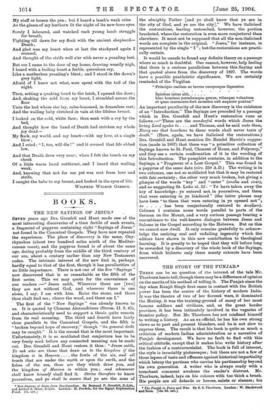SzvEN years ago Drs. Grenfell and Hunt made one of
the most interesting discoveries of a time fertile of such events, a fragment of papyrus containing eight "Sayings of Jesus" not found in the Canonical Gospels. They have now repeated the experience. The place of discovery is the same, Oxy- rhynchus (about two hundred miles south of the Mediter- ranean coast), and the papyrus found is of about the same age, dating probably from the middle of the third century of our era, about a century earlier than any New Testament codex. The intrinsic interest of the new find is, perhaps, hardly equal to that of the first, though it has peculiarities of no little importance. There is not one of the five " Sayings " now discovered that is so remarkable as the fifth of the first series. This we may quote for the convenience of our readers :—" Jesus saith, Wherever there are [two] they are not without God, and wherever there is one alone, I say, I am with him. Raise the stone, and there thou shalt find me ; cleave the wood, and there am I."
The first of the "New Sayings" was already known to us. It is quoted by Clemens Alexandrinus (Strom. II. 9, 45), and characteristically used to support a thesis quite remote from its real meanings The third and fourth have fairly close parallels in the Canonical Gospels, and the fifth is "broken beyond hope of recovery," though "its general drift may be caught." It is the second that is the most important. Unfortunately, it is so mutilated that conjecture has to be very freely used before any connected meaning can be made out. Drs. Grenfell and Hunt restore it thus : Jesus saith, Ye ask who are those that draw us to the kingdom if the kingdom is in Heaven . . . . the fowls of the air, and all beasts that are under the earth or upon the earth, and the fishes of the sea, these are they which draw you, and the kingdom of Heaven is within you ; and whosoever shall know himself shall find it. Strive therefore to know yourselves, and ye shall be aware that ye are the sons of • New Sayings of Jesus front Oxyrhyschtut. Br Bernard P. Grenfell, D.Litt., and Arthur S. Hunt, D.Litt. London : H. Frowde, for the Egypt Exploration Fun& [le. net.I the almighty Father [and ye• shall know that ye are in the city of God, and ye are the city]." We have italicised the restorations, leaving untouched, however, the portion bracketed, where the restoration is even more conjectural than elsewhere. It must not be supposed that all the non-italicised words are complete in the originaL "Jesus," for instance, is represented by the single "I"; but the restorations are practi- cally certain.
It would be unsafe to found any definite theory on a passage- where so much is doubtful. One cannot, however, help feeling that there is a curious parallelism between this Saying and that quoted above from the discovery of 1897. The words have a possible pantheistic significance. We are certainly reminded of the Virgilian.
"Principle caelum ac terms camposque liquemtes.
Spiritus lutes alit, hinc homines pecude.mquo genus, vitaeque volantum et quae marmoreo fert monstra sub aequore pontns."
An important peculiarity of the new discovery is the existence of an "Introduction." The Sayings are preceded by a passage which in Drs. Grenfell and Hunt's restoration runs as follows :—" These are the wonderful words which Jesus the living Lord spake to. . . . and Thomas, and he said unto them, Every one that hearkens to these words shall never taste of death." (Here, again, we have italicised the restorations.) Drs. Grenfell and Hunt mention Dr. Rendel Harris's sugges- tion (made in 1897) that there was "a primitive collection of Sayings known to St. Paul, Clement of Rome, and Polycarp," and they see a certain confirmation of it in the wording of this Introduction. The pamphlet contains, in addition to the a "Fragment of a Lost GospeL" This was found in a papyrus of the same date (circ. 250 A.D.) The writing is in two columns, one not so mutilated but that it may be restored with fair certainty ; the other very much broken, but giving a. glimpse of the words " key " and "enter" (xxeila and glafix), and so suggesting St. Luke xi. 52: "Ye have taken away the key of knowledge : ye entered not, in yourselves, and them that were entering in ye hindered" (the latter phrase may have been "to them that were entering in ye opened not "; cia . has been conjecturally restored to olyEgare). Column 1 contains some words parallel to parts of the Sermon on the Mount, and a very curious passage bearing a resemblance to the well-known dialogue between Jesus and Salome in the Gospel according to the Hebrews. But on this we cannot now dwell. It only remains gratefully to acknow- ledge the untiring zeal and unfailing ingenuity which the- editors have shown in this new contribution to theological learning. It is greatly to be hoped that they will before long be rewarded by a discovery of the whole book of the Sayings, from which hitherto only these scanty extracts have been recovered.
THE STORY OF THE PUNJAB.*


























































 Previous page
Previous page